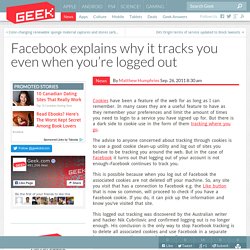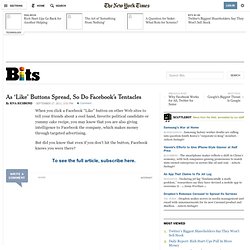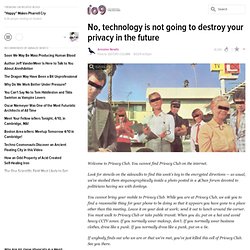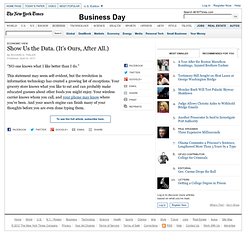

The Evolution of Privacy on Facebook. About Facebook is a great service.

I have a profile, and so does nearly everyone I know under the age of 60. However, Facebook hasn't always managed its users' data well. In the beginning, it restricted the visibility of a user's personal information to just their friends and their "network" (college or school). DPI. Shunned Profiling Technology on the Verge of Comeback.
WSJ on What They Know. Bigbrotherinc. 'Scrapers' Dig Deep for Data on the Web. The Surveillance Catalog - The Wall Street Journal. As the Internet has grown to handle more data, monitoring companies have had to keep up.

Interception now can mean taking all the traffic from the Internet backbone and funneling it through devices that inspect the packets of data, determine what is inside them, and make decisions about whether to copy them for law enforcement. Facebook data storage. Facebook consistently reappears in the news with regards to privacy and the data it keeps on each of its users. For example, earlier this week an engineer working for the social network had to explain why Facebook tracks you even when you’re logged out . While Facebook insists it does not share your details with anyone, would it surprise you to find the amount of data stored about each user may in fact total 800 pages?
It certainly surprised me. If you live in Europe, then you have the right under a European data protection law to request a copy of all information stored about you on any given service. In the case of Facebook, you can demand such information via the Personal Data Requests form . The website Europe versus Facebook (EvF) decided to share the data it received in response to such a request, and the sheer amount of information is quite staggering. The document is split into sections, all of which can be seen listed in the image below: 600,000 hacks a day, welcome to Facebook. SANS Security Analytics survey Every 24 hours 600,000 Facebook accounts are subject to attempted hacking or violation, Facebook has revealed.

Facebook explains why it tracks you even when you're logged out. Cookies have been a feature of the web for as long as I can remember.

Either Mark Zuckerberg got a whole lot less private or Facebook's CEO doesn't understand the company's new privacy settings. FB tracking on Like-button sites. When you click a Facebook “Like” button on other Web sites to tell your friends about a cool band, favorite political candidate or yummy cake recipe, you may know that you are also giving intelligence to Facebook the company, which makes money through targeted advertising.

Personal Data Requests. Facebook Friend Ranking. Industry Tinkers to Create Privacy Tools for Mobile Devices - NYTimes.com. Transparent Society doesn't work. David Brin here, responding to Analee's - ahem - somewhat inaccurate portrayal of my work and arguments and beliefs.

Look, I like a good argument as much as anybody. But it can be nice when people actually bother to read-up on the opinions of another person, before publicly setting up a false strawman and proclaiming "this is what he believes! " In this case, alas - while I like and respect Analee and io9 - this is simply beyond acceptable: "For decades now, science fiction author David Brin has been arguing that technology is pushing us towards a "transparent society" where we lose our privacy but gain "transparent" systems of authority to make up for it. " Ah. In fact, anyone who actually cracked open a copy of The Transparent Society would find a nuanced and thoughtful appraisal that takes no cartoony position. One that freedom essentially allows. I do go on to show that these things must come in that order, freedom above-all... and then some privacy. Hide from the eyes. Pseudonomity. The Nymwars rage on.

Over the past several weeks Google has been engaged in a very public struggle with its users over its “real names” policy on Google+, prompting blog posts and editorials debating the pros and cons of allowing pseudonymous accounts on social networking sites. But there is one person for whom insisting on the use of real names on social networking sites is not enough. Unsurprisingly, that person is Facebook’s Marketing Director, Randi Zuckerberg. Speaking last week on a panel discussion about social media hosted by Marie Claire magazine, Zuckerberg said,
Public Privacy. Resources. Standardization of Personal Data. This statement may seem self-evident, but the revolution in information technology has created a growing list of exceptions.

Your grocery store knows what you like to eat and can probably make educated guesses about other foods you might enjoy. Your wireless carrier knows whom you call, and your phone may know where you’ve been. And your search engine can finish many of your thoughts before you are even done typing them. Companies are accumulating vast amounts of information about your likes and dislikes. But they are doing this not only because you’re interesting. The collection and dissemination of this information raises a host of privacy issues, of course, and the bipartisan team of Senators John Kerry and John McCain has proposed what it is calling the Commercial Privacy Bill of Rights to deal with many of them. This month in Britain, the government announced an initiative along these lines called “mydata.”
Let’s return to the smartphone example. So let’s level the playing field.
Tools. Reputation. Right to be Forgotten. Examples.